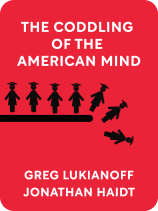

This article is an excerpt from the Shortform book guide to "The Coddling of the American Mind" by Greg Lukianoff and Jonathan Haidt. Shortform has the world's best summaries and analyses of books you should be reading.
Like this article? Sign up for a free trial here .
What is The Coddling of the American Mind book about? What are the three “Great Untruths” shared in the book?
The Coddling of the American Mind is Jonathan Haidt and Greg Lukianoff book about the growing fragility of colleges and young people today. The authors discuss three “untruths” that young people are told that are dangerous for society.
Keep reading to learn what The Coddling of the American Mind is about.
Book Overview
In the book The Coddling of the American Mind, Greg Lukianoff and Jonathan Haidt identify three “Great Untruths” or bad ideas that have gained a strong foothold among young people, especially those on college campuses. Lukianoff, president of the Foundation for Individual Rights in Education, and Haidt, a social psychologist and professor at New York University, argue that these ideas have exerted a pernicious influence on the thinking of today’s young people and poisoned the atmosphere on college campuses. The three untruths are:
- You must strive to avoid bad experiences at all costs.
- You must always trust your emotions over reason.
- The world is a black-and-white battle between good people and bad people; there is no middle ground.
These ideas are at odds with traditional teachings about how young people gain wisdom, psychologically damaging to young people, and harmful to the free debate of ideas in a democratic society. The most pernicious manifestation of the Great Untruths has been shielding young people from speech and ideas that they deem “offensive” or “dangerous.”
This ranges from the “trigger warnings” placed on educational materials (which serve to warn students that the text may contain content that will be distressing or “triggering” to students), to the de-platforming of speakers on college campuses whose views are considered outside the realm of “acceptable” debate.
All of this insulates students from ideas with which they disagree. Students themselves have become more strident and militant in their demands for safety from ideas, often going so far as to claim that speech that they deem offensive is the equivalent of physical violence.
This, in turn, is deeply dangerous to the free expression of ideas and, ultimately, to the students’ own emotional development. By succumbing to their own sense of fragility and wrapping themselves in the cloak of victimhood, young people today are developing cognitive patterns similar to those of people suffering from anxiety and depression.
Exposure to hardship and conflict is an important part of emotional development—they are experiences that young people must overcome in order to lead stable, successful, and fulfilling adult lives.
Of course, young people do face genuine struggles:
- They face enormous pressure to succeed in college and land good-paying jobs, with a much weaker social safety net to support them when they face adversity.
- They are coming of age at a time of great political polarization, which amplifies the scale of disagreement and raises the stakes of debate.
- They are more diverse than previous generations, meaning that today’s young people are more likely to have experienced racism, homophobia, sexism, and other forms of prejudice.
The professors and administrators who run college campuses must be sensitive to these experiences of today’s students and update prior assumptions and ways of working. But by building a protective bubble around the young people whose intellectual and moral development they are responsible for, these adults are doing the rising generation no favor.
Ultimately, young people must develop the skills and fortitude to feel empowered. Being exposed to controversial ideas and unpleasant experiences is a vital part of human development. The key is not to crumple and retreat into learned helplessness in the face of adversity; but rather, to overcome it and emerge better and stronger. These are the challenges young people must not shy away from, but embrace.
In the book, the authors explore:
- The three “Great Untruths” or bad ideas, now widely accepted among college students, that are stifling academic freedom and hampering the social and emotional development of young people
- The reasons young people believe themselves to be so fragile—and, as a result, why they make such strident demands that their universities shut down speech that they deem to be unacceptable
- Some practical steps that parents, schools, and universities can take to teach young people to become more independent, critical thinkers.

———End of Preview———
Like what you just read? Read the rest of the world's best book summary and analysis of Greg Lukianoff and Jonathan Haidt's "The Coddling of the American Mind" at Shortform .
Here's what you'll find in our full The Coddling of the American Mind summary :
- The "three Untruths" that have taken hold of young people
- The damage that "speech codes" cause on college campuses
- How colleges are increasingly seeing students as customers







The book is a very strange mixture of irrational socialism and reasonable thought